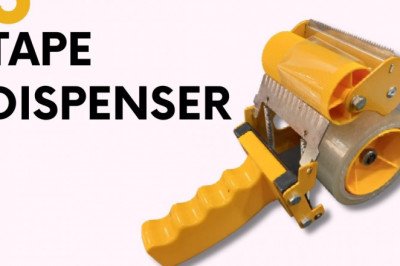views
The Benefits of Sales Automation Software: A Comprehensive Guide
Sales automation is the use of technology to streamline and automate sales processes. This includes tasks such as lead generation, lead nurturing, prospecting, customer relationship management, and sales forecasting. Sales automation software can help businesses automate repetitive tasks, such as data entry and appointment scheduling, allowing sales reps to focus on more important tasks, such as closing deals and building relationships with prospects.
Sales automation software can also help businesses track and manage leads more effectively, by automating lead scoring and routing to ensure that the most qualified leads are assigned to the appropriate sales reps. This can help businesses close deals faster and more efficiently, while also improving the overall customer experience.
Sales automation can also improve collaboration between sales reps, by providing a centralized platform for sales data and communication. This can help sales reps work together more efficiently and share information more easily.
What is Sales CRM?
A sales CRM, or Customer Relationship Management system, is a software platform designed to help businesses manage their sales processes and interactions with customers. A sales CRM typically provides a centralized location for storing and managing customer data, including contact information, sales history, and customer interactions. Sales reps can use a CRM to track leads, manage customer relationships, and monitor sales activities throughout the sales process.
Sales CRM systems typically include a range of features designed to improve sales processes and increase efficiency. This may include lead scoring and routing, automated follow-up emails, customizable sales pipelines, and analytics and reporting tools. Sales reps can use these features to track their sales activities, monitor the progress of leads and deals, and identify areas where they can improve their sales efforts.
Overall, a sales CRM is an essential tool for businesses looking to improve their sales processes, increase efficiency, and ultimately drive revenue growth. By providing a centralized platform for managing customer data and interactions, businesses can improve lead management, sales forecasting, customer experience, collaboration, and revenue, leading to increased success and growth.
Benefits of Sales Automation Software: A Comprehensive Guide
Sales automation software is a type of technology that helps businesses streamline and automate their sales processes. This software can be used for a variety of tasks, including lead generation, prospecting, customer relationship management, and sales forecasting. Here are some of the key benefits of sales automation software:
-
Increased Efficiency: Sales automation software can help businesses automate repetitive and time-consuming tasks, such as data entry, lead qualification, and appointment scheduling. This allows sales reps to focus on more important tasks, such as closing deals and building relationships with prospects.
-
Improved Lead Management: Sales automation software can help businesses track and manage leads more effectively. It can automate lead scoring and routing, ensuring that the most qualified leads are prioritized and assigned to the appropriate sales reps. This can help businesses close deals faster and more efficiently.
-
Better Sales Forecasting: Sales automation software can help businesses forecast future sales and revenue more accurately. By tracking sales data and trends, businesses can identify patterns and make more informed sales predictions. This can help businesses plan their sales strategies more effectively and make better decisions about resource allocation.
-
Enhanced Customer Experience: Sales automation software can help businesses deliver a more personalized and engaging customer experience. By automating customer interactions and tracking customer data, businesses can better understand customer needs and preferences, and tailor their sales and marketing efforts accordingly.
-
Improved Collaboration: Sales automation software can help sales teams collaborate more effectively. By providing a centralized platform for sales data and communication, sales reps can work together more efficiently and share information more easily.
-
Increased Revenue: Ultimately, the primary benefit of sales automation software is increased revenue. By automating and streamlining sales processes, businesses can close deals faster, more efficiently, and with less effort. This can help businesses increase their sales and revenue over time.
In summary, sales automation software can offer many benefits to businesses, including increased efficiency, better lead management, improved sales forecasting, enhanced customer experience, improved collaboration, and increased revenue. By adopting sales automation software, businesses can streamline their sales processes and improve their bottom line.
Sales Automation-Best Practices
Here are some sales automation best practices:
-
Define Your Sales Process: Before implementing sales automation, it's important to have a well-defined sales process. This will help you determine which sales activities can be automated and which require human interaction.
-
Choose the Right Sales Automation Tool: There are many sales automation tools available in the market. Choose one that aligns with your sales process and provides the features you need to automate your sales activities.
-
Integrate with Your CRM: Integrating your sales automation tool with your Customer Relationship Management (CRM) system will help you keep your customer data up-to-date and accurate.
-
Segment Your Leads: Use your sales automation tool to segment your leads based on their level of interest and engagement. This will help you prioritize your sales efforts and focus on the most promising leads.
-
Use Personalized Communication: Personalized communication can help you build stronger relationships with your prospects and customers. Use your sales automation tool to send personalized emails and messages.
By following these sales automation best practices, you can streamline your sales process, increase productivity, and improve your bottom line.
Wrapping it Up:
In conclusion, sales automation software can be an effective tool for businesses looking to increase sales and improve their sales processes. With the ability to automate and streamline sales processes, businesses can save time, increase efficiency, and ultimately increase revenue. Sales teams may automate time-consuming, repetitive operations, receive real-time visibility into sales activity and customer interactions, and make informed decisions by using the best sales CRM system with Office24by7's sales automation features. To learn more, call +91 7097171717.












Comments
0 comment